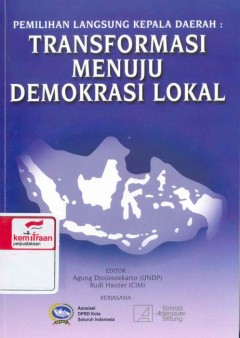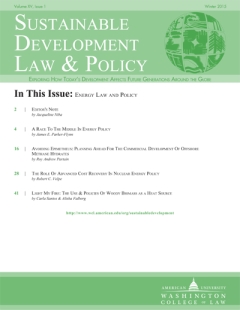Filter by

Social Psychology
- Edition
- -
- ISBN/ISSN
- 9780393913231
- Collation
- xxii, 621p.; 27 cm
- Series Title
- -
- Call Number
- 300 GIL s
- Edition
- -
- ISBN/ISSN
- 9780393913231
- Collation
- xxii, 621p.; 27 cm
- Series Title
- -
- Call Number
- 300 GIL s

HBR guide to persuative presentations
- Edition
- -
- ISBN/ISSN
- 978-1-4221-8710-4
- Collation
- xvii, 227p.; 23 cm
- Series Title
- -
- Call Number
- 658.4 HAR h
- Edition
- -
- ISBN/ISSN
- 978-1-4221-8710-4
- Collation
- xvii, 227p.; 23 cm
- Series Title
- -
- Call Number
- 658.4 HAR h

Lanskap otonomi daerah : analisa dan kritik
Sejak awal, hadirnya UU No. 32/2004 sudah terlihat betapa pihak yang paling diuntungkan adalah elit lokal dan nasional. Semangat UU ini lebih banyak dalam bidang distribusi kekuasaan dan pembagian keputusan ketimbang memberikan otonomi kearah kemandirian daerah. Ini tetap saja intinya menyangkut pemerintahan, serta bukan otonomi dalam artian yang lebih luas. Hany saja, apa yang disebut pemerint…
- Edition
- -
- ISBN/ISSN
- 979-98221-2-2
- Collation
- xiv, 198p.; 23 cm
- Series Title
- -
- Call Number
- 352, PIL, l

Pemilihan langsung kepala daerah: transformasi menuju demokrasi lokal
- Edition
- -
- ISBN/ISSN
- -
- Collation
- xiii, 139p.; 21 cm
- Series Title
- -
- Call Number
- 352, DJO, p
- Edition
- -
- ISBN/ISSN
- -
- Collation
- xiii, 139p.; 21 cm
- Series Title
- -
- Call Number
- 352, DJO, p

John P. Kotter on what leaders really do
Widely acknowledged as the world's foremost authority on leadership, John Kotter has devoted his remarkable career to studying organizations and those who run them, and his bestselling books and essays have guided and inspired leaders at all levels. Here, in this collection of his acclaimed Harvard Business Review articles, is an astute assessment of the real work of leaders, as only John Kotte…
- Edition
- -
- ISBN/ISSN
- 0875848974
- Collation
- 181p.; 22 cm
- Series Title
- -
- Call Number
- 658.4 KOT j

HBR guide to getting the right work done
- Edition
- -
- ISBN/ISSN
- 9781422187111
- Collation
- x, 184p.; 23 cm
- Series Title
- -
- Call Number
- 658.4 HAR h
- Edition
- -
- ISBN/ISSN
- 9781422187111
- Collation
- x, 184p.; 23 cm
- Series Title
- -
- Call Number
- 658.4 HAR h

Sustainable Development Law & Policy, Volume 12, Issue 3, Spring 2012
- Edition
- -
- ISBN/ISSN
- 15523721
- Collation
- -
- Series Title
- -
- Call Number
- -
- Edition
- -
- ISBN/ISSN
- 15523721
- Collation
- -
- Series Title
- -
- Call Number
- -

Sustainable Development Law & Policy, Volume 13, Issue 1, 2012-2013
- Edition
- -
- ISBN/ISSN
- 15523721
- Collation
- -
- Series Title
- -
- Call Number
- -
- Edition
- -
- ISBN/ISSN
- 15523721
- Collation
- -
- Series Title
- -
- Call Number
- -

HBR's 10 must reads on communication
- Edition
- 1st edition
- ISBN/ISSN
- 9781422189863
- Collation
- xv, 190p.; 21 cm
- Series Title
- -
- Call Number
- 658.4 HAR h
- Edition
- 1st edition
- ISBN/ISSN
- 9781422189863
- Collation
- xv, 190p.; 21 cm
- Series Title
- -
- Call Number
- 658.4 HAR h

Social Research: an international quarterly, Volume 79, Number 4, Winter 2012
- Edition
- -
- ISBN/ISSN
- 0037-783X
- Collation
- -
- Series Title
- -
- Call Number
- -
- Edition
- -
- ISBN/ISSN
- 0037-783X
- Collation
- -
- Series Title
- -
- Call Number
- -

Cultural psychology
Steven Heine is one of the leading figures in the field of cultural psychology. In addition to presenting the importance of culture to the study of behavior, Cultural Psychology, Second Edition, has a strong emphasis on research methodology, which comes out of in-depth discussions of select topics and studies in each chapter-encouraging students to understand common behaviors in different cultu…
- Edition
- -
- ISBN/ISSN
- 978-0-393-91283-8
- Collation
- xxiii, 567p.; 24 cm
- Series Title
- -
- Call Number
- 155.8 HEI c

Innovation as usual: how to help your people bring great ideas to life
Most organizations approach innovation as if it were a sideline activity. Every so often employees are sent to �Brainstorm Island�: an off-site replete with trendy lectures, creative workshops, and overenthusiastic facilitators. But once they return, it�s back to business as usual. Innovation experts Paddy Miller and Thomas Wedell-Wedellsborg suggest a better approach. They recommend that le…
- Edition
- -
- ISBN/ISSN
- 978-1-4221-4419-0
- Collation
- viii, 218p.; 22 cm
- Series Title
- -
- Call Number
- 658.4 MIL i

From workplace to playspace: innovating, learning and changing through dynami…
From Workplace to Playspace is about visionary, courageous, innovative, and persistent organizations that challenge long-held preconceptions about the incompatibility of workplace and playspace. Each day organizations across industries and with wide-ranging missions are discovering that playspace is the space they can and must create every day at work if they are to think creatively, question o…
- Edition
- -
- ISBN/ISSN
- 978-0-470-46722-0
- Collation
- xxiv, 232p.; 24 cm
- Series Title
- -
- Call Number
- 306.3 MEY f

Cultivating communities of practice
Today's economy is fueled by knowledge. Every leader knows this to be true, yet few have systematic methods for converting organizational knowledge into economic value. This book argues that communities of practice--groups of individuals formed around common interests and expertise--provide the ideal vehicle for driving knowledge-management strategies and building lasting competitive advantage.…
- Edition
- -
- ISBN/ISSN
- 978-1-57851-330-7
- Collation
- xii, 284p.; 24,5 cm
- Series Title
- -
- Call Number
- 658.4 WEN c

Lead like Reagan: strategies to motivate, communicate and inspire
Lead Like Reagan is a guide to more effective leadership, inspired by the Great Communicator himself. Drawing upon his time serving Ronald Reagan, author Dan Quiggle relates lessons learned first-hand from his front row seat to history. Using Reagan and other prominent business leaders as examples, Quiggle illustrates what leadership looks like at the highest levels, why such leadership is effe…
- Edition
- -
- ISBN/ISSN
- 978-1-118-92845-5
- Collation
- xiii, 162p.; 24 cm
- Series Title
- -
- Call Number
- 920 REA l

The Seven non-negotiables of winning: trying soft traits to hard results
Contrary to most conventional management wisdom, The 7 Non-Negotiables of Winning looks beyond employee skills and background and to identify the true game-changing character traits for creating a winning culture. Based on the author's methodology for what abilities drive decisions and actions within his own company, The 7 Non-Negotiables of Winning details how respect, belief, loyalty, commitm…
- Edition
- -
- ISBN/ISSN
- 978-1-118-73920-4
- Collation
- xx, 181p.; 24 cm
- Series Title
- -
- Call Number
- 658.4 WIL s

Managing up: forge strong ties set clear expectations promote your ideas
Your boss plays an important role in your career. So how do you navigate this delicate, significant professional relationship without playing political games or compromising your character? Managing Up offers concise, expert tips on: (1) Understanding your manager's priorities and pressures, (2) Setting a positive tone for the relationship, (3) Managing expectations--and egos, and (4) Earning t…
- Edition
- -
- ISBN/ISSN
- 978-1-62527-084-9
- Collation
- viii, 77p.; 18 cm
- Series Title
- -
- Call Number
- 658.4 HAR m

Policy brief: dokumen kependudukan; pemenuhan hak dan pelaksanaan kewajiban w…
- Edition
- 1st print
- ISBN/ISSN
- -
- Collation
- 51p.; 21 cm
- Series Title
- -
- Call Number
- 306.74 KEM p
- Edition
- 1st print
- ISBN/ISSN
- -
- Collation
- 51p.; 21 cm
- Series Title
- -
- Call Number
- 306.74 KEM p
Menguak Stigma, kekerasan & Diskriminasi pada LGBT di Indonesia
- Edition
- -
- ISBN/ISSN
- 978-979-17190-2-5
- Collation
- xxiv, 124p.; 24 cm
- Series Title
- -
- Call Number
- 305.4 LAA m
- Edition
- -
- ISBN/ISSN
- 978-979-17190-2-5
- Collation
- xxiv, 124p.; 24 cm
- Series Title
- -
- Call Number
- 305.4 LAA m

Instrumen Indek Tata Kelola Kepolisian Negara Republik Indonesia
- Edition
- -
- ISBN/ISSN
- -
- Collation
- iiregular pages; 21 cm
- Series Title
- -
- Call Number
- 363.2 IND i
- Edition
- -
- ISBN/ISSN
- -
- Collation
- iiregular pages; 21 cm
- Series Title
- -
- Call Number
- 363.2 IND i
 Computer Science, Information & General Works
Computer Science, Information & General Works  Philosophy & Psychology
Philosophy & Psychology  Religion
Religion  Social Sciences
Social Sciences  Language
Language  Pure Science
Pure Science  Applied Sciences
Applied Sciences  Art & Recreation
Art & Recreation  Literature
Literature  History & Geography
History & Geography